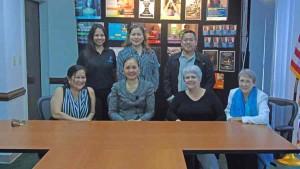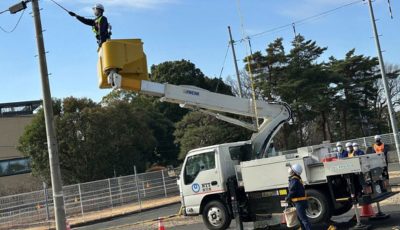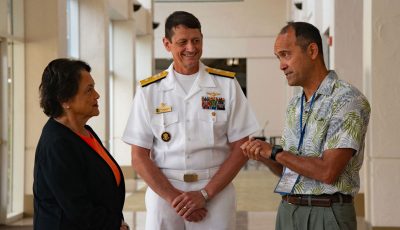Public urged to be aware of human trafficking red flags

U.S. Attorney for the Districts of Guam and the NMI Alicia Limtiaco and Karidat executive director Lauri Ogumoro, both seated center, pose with other members of the NMI Human Trafficking Intervention Coalition during a press briefing yesterday. (Ferdie De La Torre)
Alicia Limtiaco, U.S. Attorney for the Districts of Guam and the NMI, said yesterday that all members of the public need to be aware of red flags that will assist them in identifying victims of human trafficking.
At a press briefing with members of the NMI Human Trafficking Intervention Coalition held at the U.S. Attorney’s Office conference room at Horiguchi Building in Garapan, Limtiaco said human trafficking victims are not necessarily people coming from other countries, but even the ones who are on the islands in search of a better life.
“Many of these people, if you listen to why or how their situation may have come to be, it is about searching for a better life, truly to support their children and their families,” Limtiaco said.
That means traffickers can be anyone, Limtiaco said.
“They can be single individuals. They can be family members themselves. They can be what we call mom-and-pop operation. They can be more organized criminal organizations. They can be business owners,” she said.
Limtiaco said traffickers can be women, men, older individuals, or younger individuals. What is important is that there are certain red flags that assist community members in identifying who may be a victim and that the coalition builds trust in response to persons that they believe may be at risk.
Limtiaco said the csoalition continues to support the victims and their families throughout their life time because law enforcement cannot do the job alone in addressing the problem.
Limtiaco said the need to be responsive effectively and meaningfully to victims and families is one that involves the entire community.
“It’s a network of support that involves non-government organizations, government agencies, and the private sector,” she pointed our, referring to the Coalition.
On red flags, Karidat executive director Lauri Ogumoro said basically there are two kinds of human trafficking—labor and sex trafficking or a combination of both.
Ogumoro said human trafficking victim is somebody who is working every day, never had a day off, is living in the same place where that person is working.
“They are not allowed to go out. Their employer maybe holding their documents. Those are red flags that you may come across on somebody who is victim of labor trafficking. Someone who is working round the clock and not getting paid, or they not getting paid adequately,” she said.
Ogumoro said a victim of sex trafficking is someone who is forced to sexual servitude to any kind.
“If they are minors you don’t have to consent, or if you are an adult, you are doing this against your will but because of the situation you do not have a way out,” she said.
Limtiaco said human trafficking is modern-day slavery, where men, women, and children are bought and sold into forced labor, sexual exploitation, and other injustices.
She said it is a multi-billion dollar criminal industry that denies freedom to 20.9 million people around the world.
In January 2011, the month was declared National Slavery and Human Trafficking Prevention Month.
Limtiaco said thousands of individuals, government agencies, anti-trafficking organizations, and faith communities are joining hands to raise awareness about human trafficking, and are committing to bring an end to this inexcusable human rights abuse.
Limtiaco asked media organizations this month to partner with the NMI Human Trafficking Intervention Coalition, which is a multidisciplinary coalition composed of government agencies, nonprofit organizations, and the private sector.
“We strive to respond to the needs of human trafficking victims by providing support services, hold offenders accountable through enforcement and prosecution efforts, and prevent further victimization through public awareness and outreaches,” she said.
The coalition is inviting community stakeholders to attend the proclamation signing designating January as National Slavery and Human Trafficking Month, to be held today, Monday, at 9am at the Pedro P. Tenorio Multi-Purpose Center in Susupe.



























